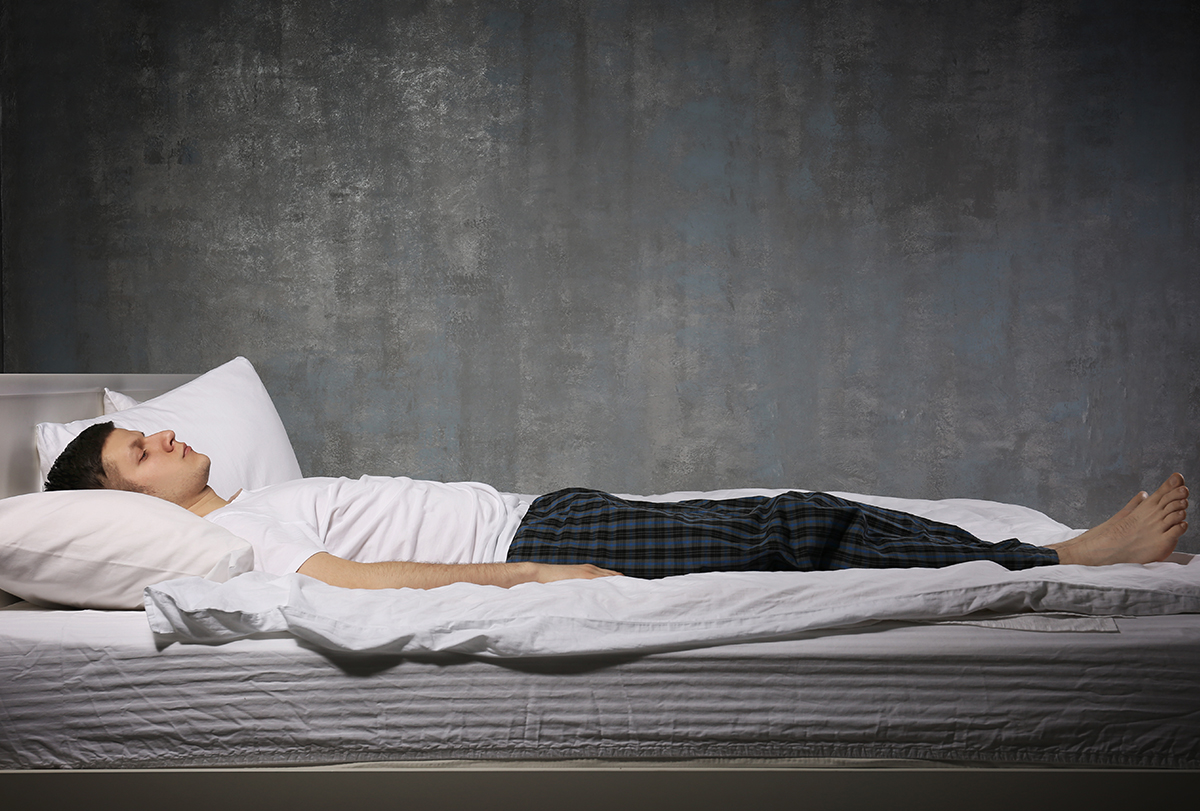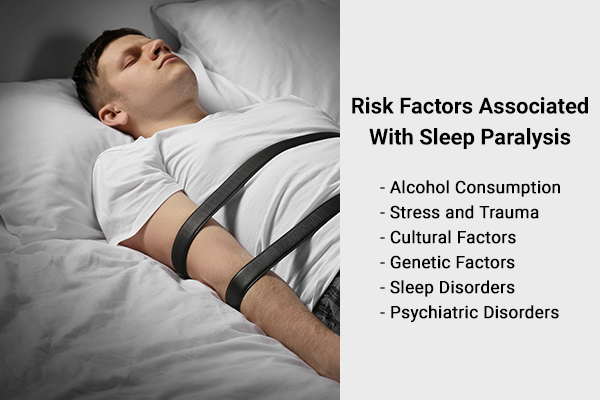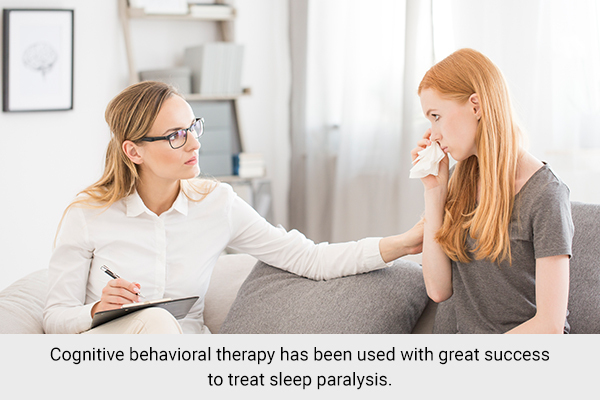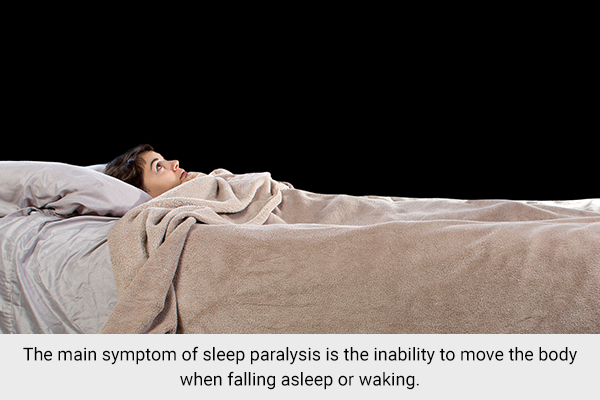In this article:
Many people have the strange experience of waking up from a deep sleep and being unable to move. This phenomenon known as sleep paralysis is quite frightening and is a transitional state between deep sleep and wakefulness.

About 8%–28% of students and 32% of psychiatric patients have sleep paralysis. (1) The onset of sleep paralysis is usually in adolescence and is attributable to identity conflicts from peer pressure and the resulting depression and anxiety. (1)
Causes of Sleep Paralysis
The phenomenon of dreams happens in normal deep sleep. There is muscle paralysis in deep sleep, which may be due to an inhibition of neurons by two neurotransmitters. (1)(2)
The probable reason for this muscle paralysis is to prevent unwanted and dangerous movements from occurring during dreaming.
In sleep paralysis, you tend to wake up while still under deep sleep-induced paralysis.
What Kind of Hallucinations Occur in Sleep Paralysis?
Sleep paralysis is often accompanied by hallucinations that fall into three categories: (2)
- Intruder hallucinations – The patient senses an evil presence in the room.
- Incubus hallucinations – The patient feels pressure on the chest, often accompanied by sensations of being choked or suffocated.
- Vestibular motor (VM) hallucinations – While the former two kinds of hallucinations are quite common and usually co-occur, the VM category of hallucinations is rare. It is characterized by illusory feelings of movement and out-of-body experiences.
Risk Factors Associated With Sleep Paralysis

The causes of sleep paralysis are unclear, but based on current research, some of the risk factors associated with sleep paralysis are as follows: (3)
1. Alcohol consumption
Many studies have linked the consumption of alcohol to a greater risk of sleep paralysis. (4) However evidence is conflicting and hence more studies are required. (3)
2. Stress and trauma
Experiencing traumatic and threatening events has been linked to increased incidence of sleep paralysis. (3)(4) Sleep paralysis is particularly prevalent in adults with a history of childhood sexual abuse, post-traumatic stress disorder, and panic disorder. (1)(3)
3. Cultural factors
Certain ethnic and cultural groups have a higher prevalence of sleep paralysis.
The highest prevalence has been reported in Cambodians, who are also said to have a history of trauma and panic disorder. In Japanese, an increased incidence of sleep paralysis is attributable to their active nightlife. (1)
According to a recent study conducted in China, sleep paralysis was reported to be higher in rural areas in comparison to urban areas. (1)
4. Genetic factors
Hereditary factors predispose a person to sleep paralysis. (3)
5. Sleep disorders
One study found that excessively short or excessively long durations of napping were associated with increased incidences of sleep paralysis. (3)
Likewise, a bedtime past midnight was associated with greater odds of developing sleep paralysis. Moreover, lying in a supine position (on the back) rather than on the sides increased the risk of sleep paralysis. (3)
ALSO READ: Sleep Disorders: Types, Causes, Adverse Effects, and More
6. Psychiatric disorders
A greater prevalence of sleep paralysis has been found in patients with post-traumatic stress disorder, panic disorder, and anxiety disorder. However, the association with depression is unclear. (3)
Prevention and Treatment for Sleep Paralysis

There are no published clinical trials and data on the treatment of sleep paralysis. Hence, alternative treatment options and adopting certain lifestyle changes are recommended.
- Meditation-relaxation (MR) therapy, which is a noninvasive four-step psychological treatment, has been used with success for the treatment of sleep paralysis. A pilot study reported a decrease of up to 50% in the number of days of sleep paralysis and a 54% decrease in the total number of episodes with MR therapy. (5)
- Regular intake of the herbs Bacopa monnieri (water hyssop) (6) and Eclipta prostrata (false daisy) (7) as herbal tea infusions has a calming effect on the brain. (6)(7) resulting in a reduced number of episodes of sleep paralysis.
- Other approaches include reducing stress, sleeping on the side and avoiding sleeping on the back, and maintaining a healthy regular sleep schedule.
- Experts advise avoiding dangerous occupations and precipitating stimuli. Planned daytime naps of 20 minutes can help.
- Cognitive-behavioral therapy (CBT) has been used with great success to treat sleep paralysis. (8) The course of treatment usually lasts between 6 and 20 sessions, with each session lasting 30–60 minutes. CBT sessions can be tailored according to the needs of the patient.
What Is Narcolepsy and Its Association With Sleep Paralysis?
People with narcolepsy often experience sleep paralysis which is a lifelong disorder (the requirement for diagnosis is 3 months) characterized by brief, frequent, refreshing episodes of daytime sleep. But it does not usually worsen as the person ages.
Symptoms can partially improve over time, but they will never disappear completely. The most typical symptoms are given below:
- Daytime sleep attacks – The patient falls asleep in seconds or minutes, despite efforts by the patient not to sleep. The patient usually sleeps from 10 to 30 minutes and wakes up refreshed, and they typically experience a single to a dozen episodes a day. Driving in this condition is dangerous.
- Cataplexy – Cataplexy is characterized by a sudden loss of muscle tone, usually in the face and neck, and is typically precipitated by anger and laughter. The patient is conscious throughout.
- Hypnagogic hallucinations – Hypnagogic hallucinations are dreamlike and often frightening auditory and or visual hallucinations that occur as the patient falls asleep.
- Sleep paralysis – Sleep paralysis is a flaccid, generalized, terrifying paralysis that lasts for several seconds in a fully conscious patient, either while walking or falling asleep. It may resolve if the patient is touched gently many times or their name is called loudly. (9)
What to Not Do in Sleep Paralysis?
Do not sleep on your back – this can make sleep paralysis more likely to happen. Also, do not eat a big meal, smoke, or drink alcohol or caffeine shortly before going to bed.
When to See a Doctor
In most cases, sleep paralysis does not affect your overall health. However, you should talk to your doctor if episodes of sleep paralysis cause anxiousness or if you are unable to sleep throughout the night and feel tired during the day.
A general practitioner may be able to treat sleep paralysis triggered by an underlying condition such as insomnia or post-traumatic stress disorder. If this doesn’t help, they may refer you to a doctor who specializes in sleep disorders.
Most-Asked Questions About Sleep Paralysis
How do I know if I have sleep paralysis?

The main symptom of sleep paralysis is the inability to move the body when falling asleep or waking and there’s no evidence of a physical disorder such as a brain tumor.
How does sleep paralysis end?
The episode usually ends on its own or when someone touches you or talks to you.
Is sleep paralysis fatal?
No, sleep paralysis is not fatal. It is only a temporary inability.
Final Word
Sleep paralysis is not a life-threatening condition, and it can be dealt with and prevented by taking the right steps. These include ensuring you get 6–8 hours of sleep at night and treating any underlying mental health problems or sleep disorders that may trigger sleep paralysis.
- Was this article helpful?
- YES, THANKS!NOT REALLY


